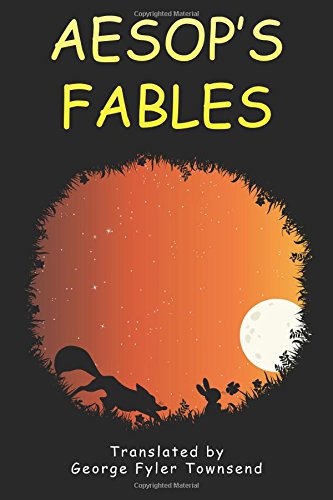Aesop’s Fables - Softcover

--- Aesop
Aesop's Fables are a collection of fables credited to Aesop (620 - 560 BC), a slave and story-teller that lived in Ancient Greece. Aesop's Fables become a blanket term for collections of brief fables, usually involving personified animals. The fables remain a popular choice for moral education of children today.---
Fictions that point to the truth
Fable as a genre
Apollonius of Tyana, a 1st-century CE philosopher, is recorded as having said about Aesop:
... like those who dine well off the plainest dishes, he made use of humble incidents to teach great truths, and after serving up a story he adds to it the advice to do a thing or not to do it. Then, too, he was really more attached to truth than the poets are; for the latter do violence to their own stories in order to make them probable; but he by announcing a story which everyone knows not to be true, told the truth by the very fact that he did not claim to be relating real events.
---Philostratus, Life of Apollonius of Tyana, Book V:14
The Greek historian Herodotus mentioned in passing that "Aesop the fable writer" was a slave who lived in Ancient Greece during the 5th century BCE. Among references in other writers, Aristophanes, in his comedy The Wasps, represented the protagonist Philocleon as having learnt the "absurdities" of Aesop from conversation at banquets; Plato wrote in Phaedo that Socrates whiled away his jail time turning some of Aesop's fables "which he knew" into verses. Nonetheless, for two main reasons – because numerous morals within Aesop's attributed fables contradict each other, and because ancient accounts of Aesop's life contradict each other – the modern view is that Aesop did not solely compose all those fables attributed to him, if he even existed at all. Instead, any fable tended to be ascribed to the name of Aesop if there was no known alternative literary source.
In Classical times there were various theorists who tried to differentiate these fables from other kinds of narration. They had to be short and unaffected; in addition, they are fictitious, useful to life and true to nature. In them could be found talking animals and plants, although humans interacting only with humans figure in a few. Typically they might begin with a contextual introduction, followed by the story, often with the moral underlined at the end. Setting the context was often necessary as a guide to the story's interpretation, as in the case of the political meaning of The Frogs Who Desired a King and The Frogs and the Sun.
Sometimes the titles given later to the fables have become proverbial, as in the case of 'killing the Goose that Laid the Golden Eggs or the Town Mouse and the Country Mouse. In fact some fables, such as The Young Man and the Swallow, appear to have been invented as illustrations of already existing proverbs. One theorist, indeed, went so far as to define fables as extended proverbs. In this they have an aetiological function, the explaining of origins such as, in another context, why the ant is a mean, thieving creature. Other fables, also verging on this function, are outright jokes, as in the case of The Old Woman and the Doctor, aimed at greedy practitioners of medicine.
"synopsis" may belong to another edition of this title.
Aesop (620–564 BC) was an ancient Greek story teller credited with a number of fables now collectively known as ‘Aesop's Fables’, though no actual writings by him survive. Many of Aesop’s fables are characterised by anthropomorphic animals that speak and solve problems and end with important morals for the education of children and society at large.
"About this title" may belong to another edition of this title.
- PublisherCreateSpace Independent Publishing Platform
- Publication date2014
- ISBN 10 1500731048
- ISBN 13 9781500731045
- BindingPaperback
- Number of pages342
- IllustratorClassic Good Time
- Rating
(No Available Copies)
Search Books: Create a WantIf you know the book but cannot find it on AbeBooks, we can automatically search for it on your behalf as new inventory is added. If it is added to AbeBooks by one of our member booksellers, we will notify you!
Create a Want
